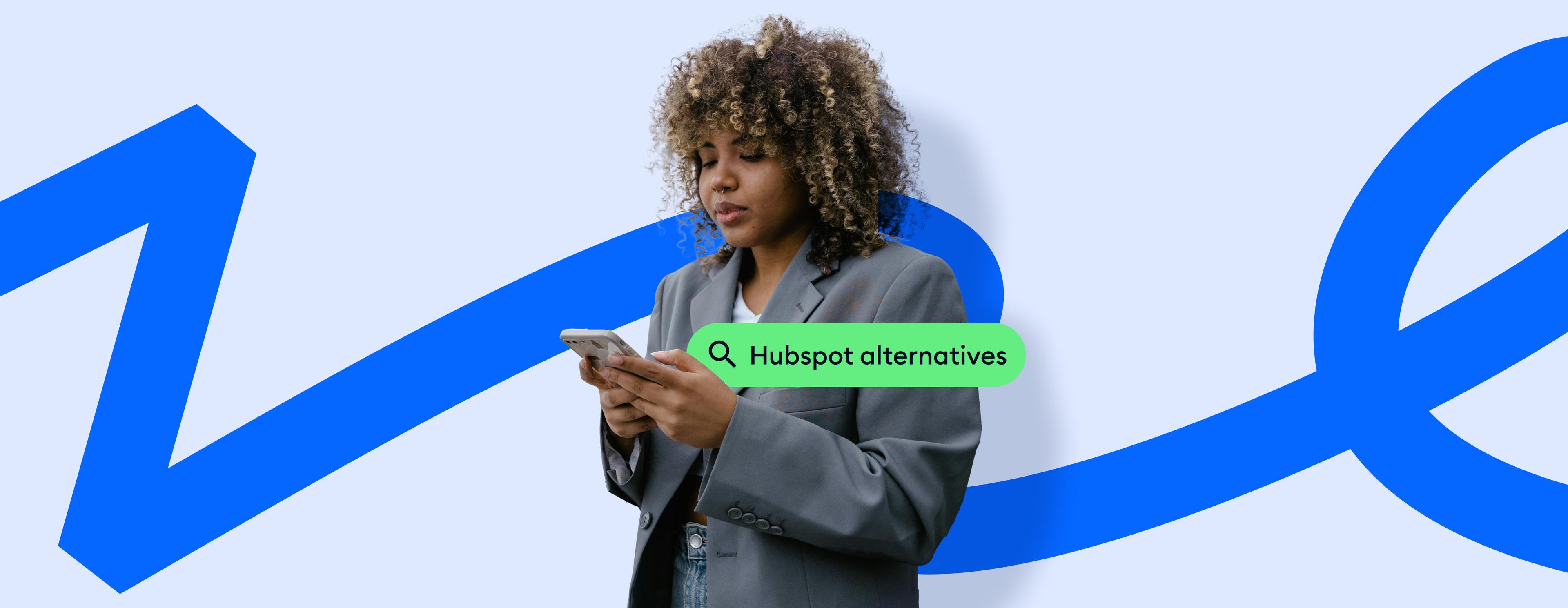HubSpot is renowned for its comprehensive marketing and sales solutions.
And it’s no secret that a CRM is necessary for tracking and managing customer relationships. So, businesses use this system to manage client interactions, generate leads, and push sales conversions.
While the software is popular in the industry, it’s not a one-size-fits-all solution. Many companies may opt to look for HubSpot alternatives due to reservations about pricing, customization requirements, or inadequate features.
So—
If you are looking for other options, there are several competitors you should consider for your brand.
In this article, we will explore the following platforms:
Use the best HubSpot alternative available on the market
If you’re looking for more tools to manage your customer relations, check out these articles:
- 10 Best Customer Database Software Solutions
- 16 Customer Retention Software Tools to Reduce Churn
- 18 Free CRM Software for Your Business
Before we jump to answer the question ‘who are Hubspot’s competitors’, let’s learn the background information first.
Why should you look for a HubSpot alternative?
HubSpot is a customer relationship management (CRM) system and client support software for nurturing leads and enhancing communication. The platform assists marketers, sales teams, support teams, and content creators by providing a whole stack of features. HubSpot is one of the best inbound marketing solutions used by thousands of users.
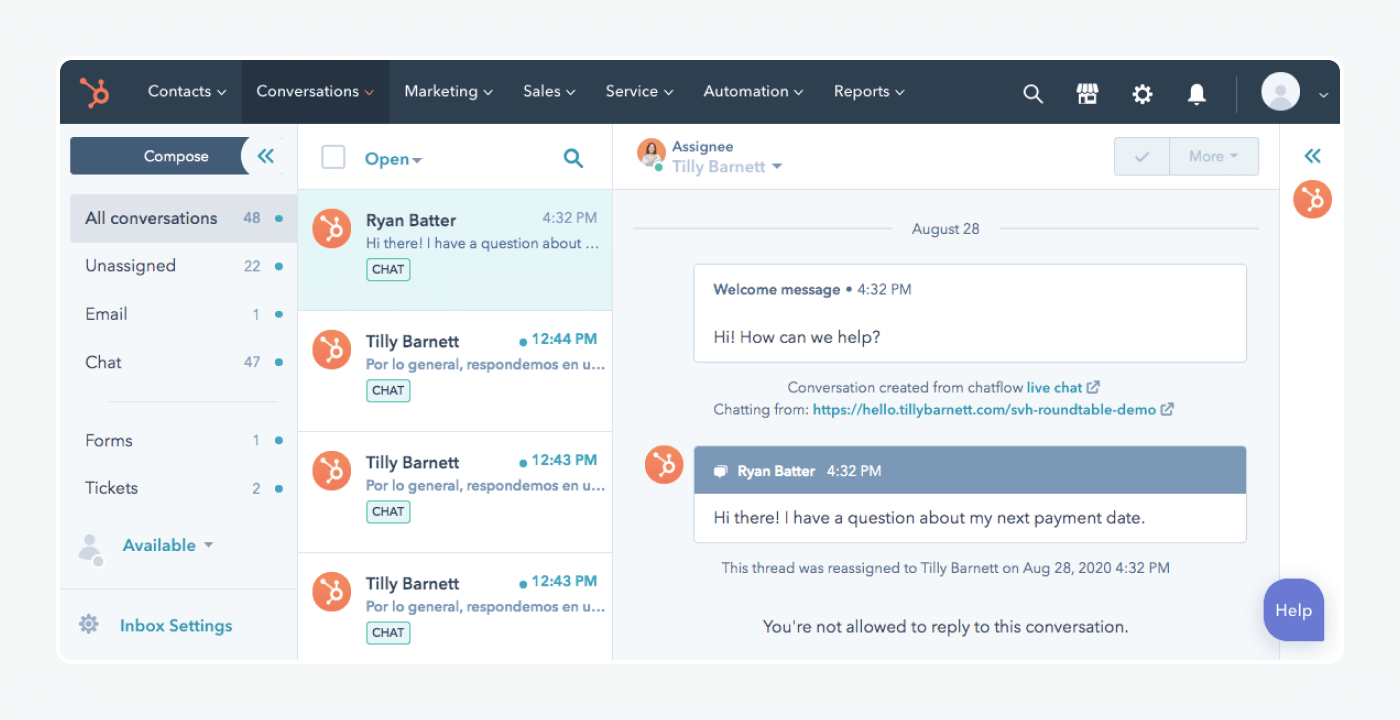
The solution offers many unique features including:
- Free CRM—allows to track leads on a virtual sales pipeline with a single click, assign tasks, and follow up on conversions by viewing clients’ statuses
- Live chat—connects team members with visitors in real time for lead conversion, deal closure, and support requests
- Free chatbot builder—enables fast response times to routine questions and automatically welcomes all visitors
That being said, Hubspot is not without its problems that may impact various aspects of a company’s operations. The cons range from deployment and running costs to technical limitations of the software. Potential users need to weigh the cons against their needs and resources to decide whether this platform is the right fit for their brand.
Some of the drawbacks of Hubspot include:
- Extra cost for advanced add-ons—marketing teams need to upgrade their pricing plans to access additional CRM capabilities which can prove costly for small organizations
- Limited contact selection features—the inability to filter out contacts simultaneously is a challenge for enterprises with large volumes of contacts
- Inferior user interface—while the software has a functional user interface (UI), users find the UI monotonous which reduces productivity and engagement from team members
- Basic analytics and reporting—the dashboard is not very customizable which can bring gaps in data analysis and gathering insights for strategic decision-making
Did you know that…
As many as 76% of customers expect consistent interactions across departments. On top of that, a whopping 81% of consumers say a positive experience with a brand increases the chances of them becoming returning clients.
If you are resolved to switching to an alternative to HubSpot, then let’s discover what your best options are.
10 best HubSpot alternatives
While HubSpot is ideal for small to medium-sized enterprises, it may not be suitable for all ventures. Be that as it may, here is a list of the ten best HubSpot CRM alternatives.
During compilation, we evaluated the platforms according to specific product capabilities, service, and support, deployment and integration, as well as pricing. Here’s a comparison table for a quick look at all the systems we’ll present in this article.
| Software | G2 rating | Free plan | Best for |
|---|---|---|---|
| Tidio | 4.7/5 ⭐️ | ✅ | AI chatbots |
| Activecampaign | 4.4/5 ⭐️ | Free trial available | Omnichannel marketing |
| Engagebay | 4.6/5 ⭐️ | ✅ | Live chat software |
| Pipedrive | 4.2/5 ⭐️ | Free trial available | CRM software |
| Salesforce | 4.3/5 ⭐️ | Free trial available | AI copilot |
| Freshworks | 4.4/5 ⭐️ | ✅ | AI assistant |
| Intercom | 4.5/5 ⭐️ | Free trial available | Shared mailbox |
| Mailchimp | 4.4/5 ⭐️ | ✅ | Email automation |
| Klaviyo | 4.6/5 ⭐️ | ✅ | Customer data platform |
| Zoho Desk | 4.4/5 ⭐️ | Free trial available | Omnichannel |
So, let’s jump into the in-depth HubSpot competitors analysis.
1. Tidio
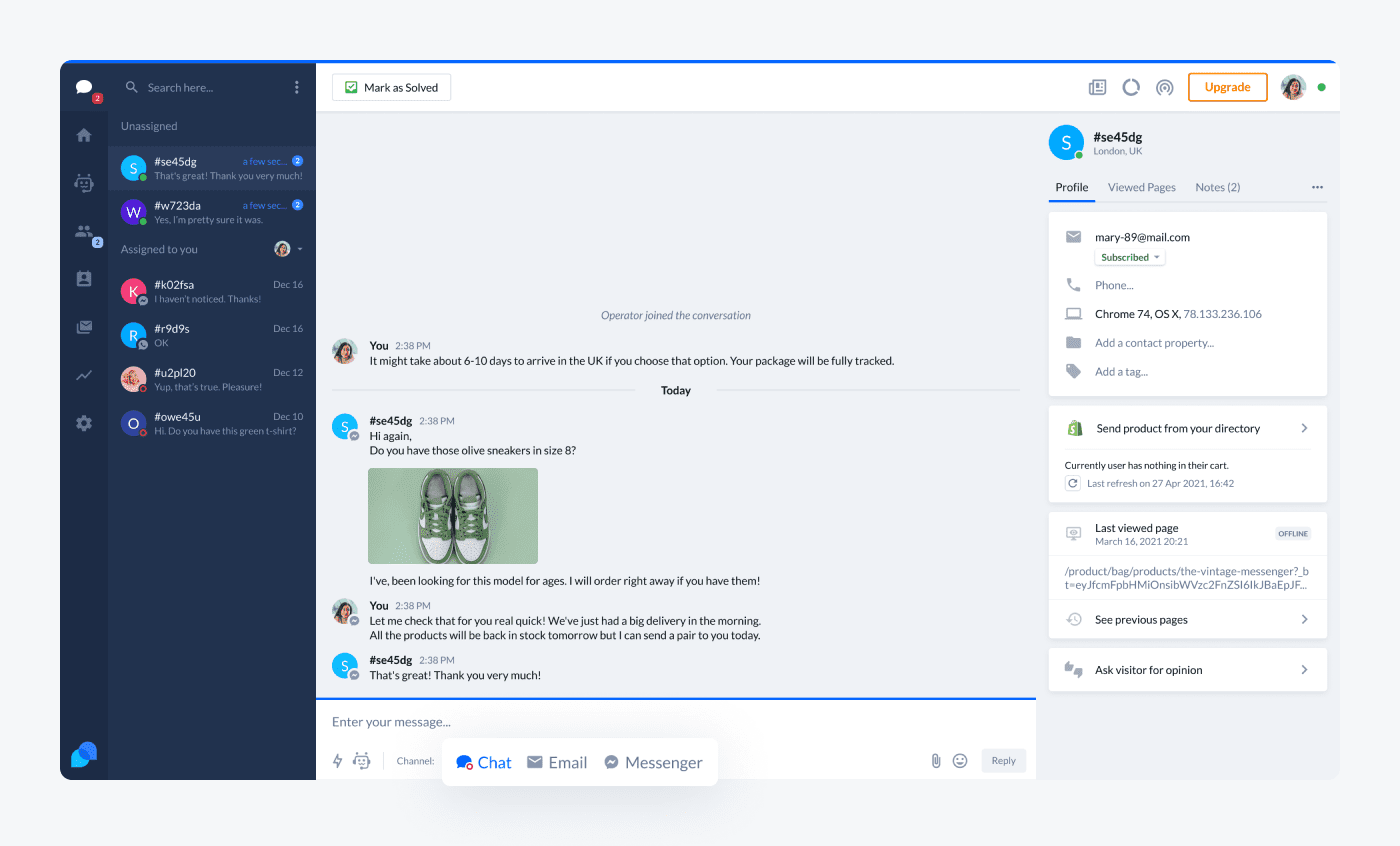
Ratings: 4.7/5 ⭐️ (1,400+ reviews)
Tidio is an AI-oriented customer service solution for SMBs. Its conversational AI can resolve up to 70% of routine support requests in 7 different languages. This HubSpot alternative offers AI chatbots and chat flows that generate responses for routine requests and free up support agents to focus on complex tasks.
The platform helps your team handle all customer communications from a single dashboard. On top of that, the ticketing system is useful in prioritizing requests and tracking inquiries while actionable analytics help you keep track of your agents’ as well as chatbots’ performance.
Key features:
- Customer segmentation
- Shared inbox for all client interactions
- AI and NLP chatbots
- Multi-channel support
- Built-in email marketing templates
- 120+ integrations available
- Free version available
- Starter ($29/mo)
- Flows ($29/mo)
- Lyro AI ($39/mo)
- Growth ($59/mo)
- Tidio+ (starts at $749/mo)
Grow your business using the best customer experience platform
Read more: Learn how to use Tidio’s helpdesk to its fullest potential.
2. ActiveCampaign
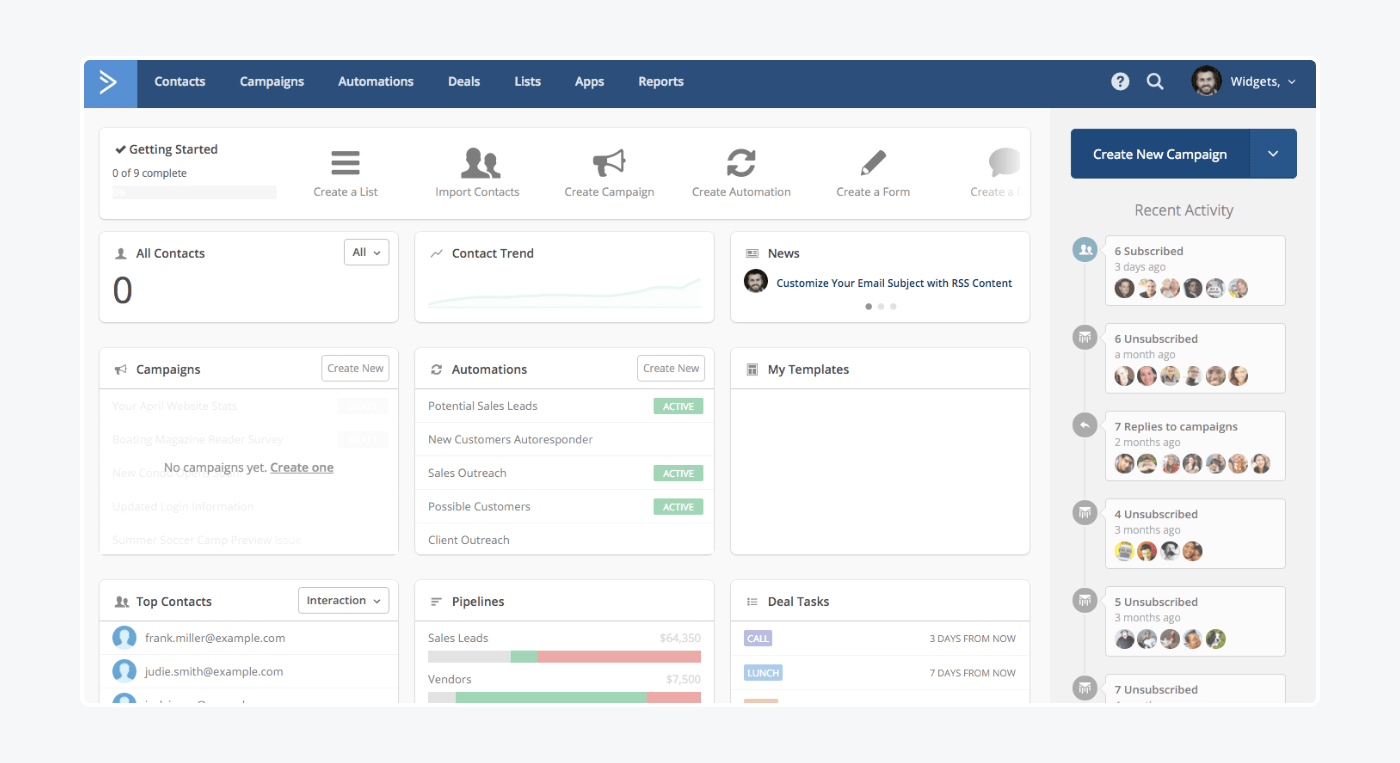
Ratings: 4.4/5 ⭐️ (1,900+ reviews)
ActiveCampaign is an email marketing service that offers automation, CRM system, and sales engagement tools. It also provides affordable support features for small businesses and built-in integrations including Shopify, WordPress, Salesforce, Facebook, and Google.
This HubSpot CRM alternative is suitable for data-driven support teams that will benefit from its advanced reporting and analytics capabilities. Agents can track events and website performance through the platform’s unified dashboards. They can also automate custom workflows and user segmentation.
Pros:
- Omnichannel marketing
- Custom email marketing templates
- Over 870 third-party integrations
Cons:
- Steep learning curve for new users
- Relatively expensive for scaling businesses
- Slow customer support
- Free trial available
- Plus ($23/mo)
- Professional ($59/mo)
- Enterprise ($119/mo)
Did you know that…
Customers who use multiple channels when they shop have a 10% higher lifetime value than those who use only one channel.
3. Engagebay
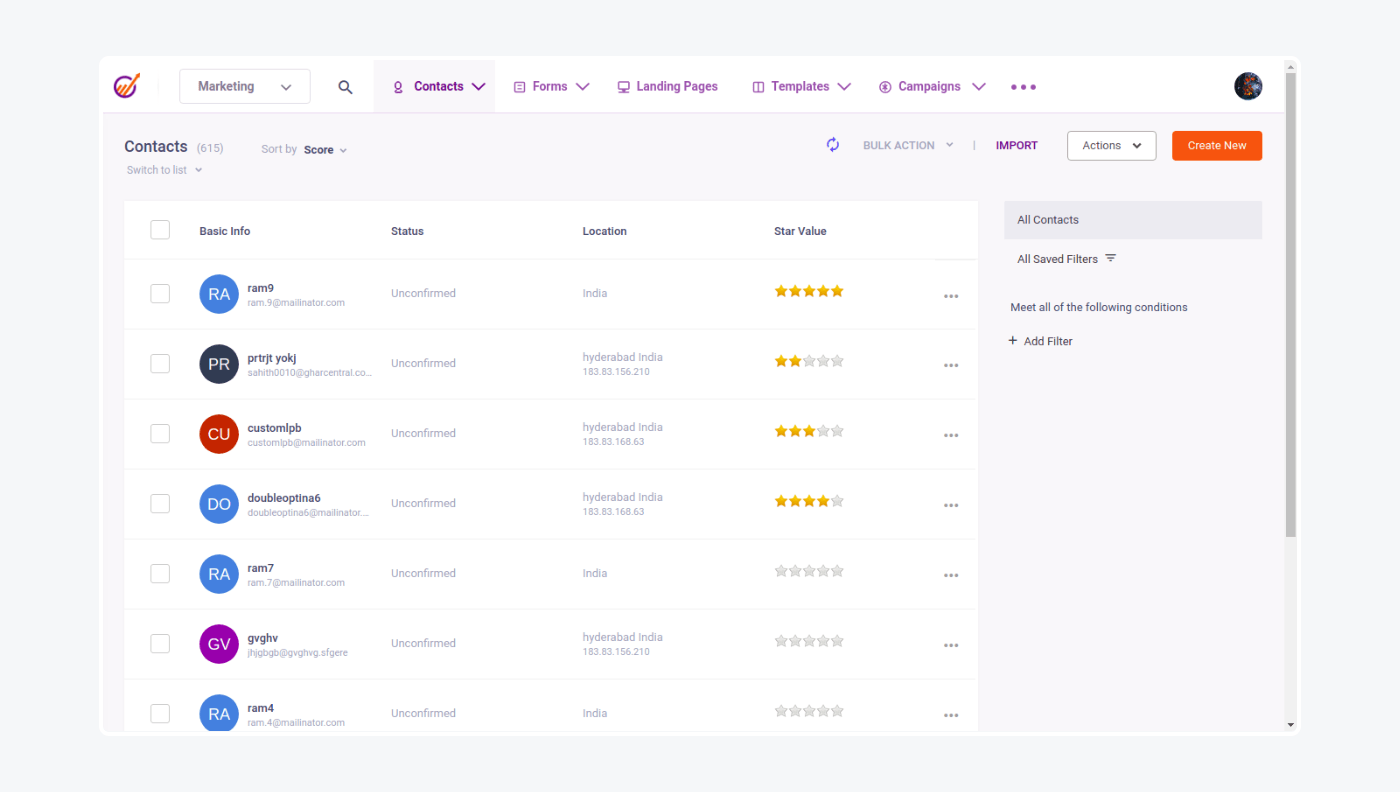
Ratings: 4.6/5 ⭐️ (240+ reviews)
Engagebay is an all-in-one CRM software designed for startups to scale their businesses to the next level. It provides a marketing automation suite for businesses to nurture their customers, and automate routine repetitive tasks. Its CRM tool enables sales teams to sort and arrange email contacts, track leads, and grow the sales pipeline.
What makes this HubSpot competitor unique is the workflow automation and communication sequencing features. Users can enjoy functionality for lead generation, lead nurturing, contact management, and appointment scheduling. Support teams can take advantage of this system’s help desk feature to track, prioritize, and solve client tickets.
Pros:
- Free live chat software
- Email sequences
- Complete customer views
Cons:
- Users reported integration issues
- Lacks dashboard customization
- Frequent system lag time
- Free version available
- Basic ($14.99/mo/user)
- Growth ($64.99/mo/user)
- Pro ($119.99/mo/user)
4. Pipedrive
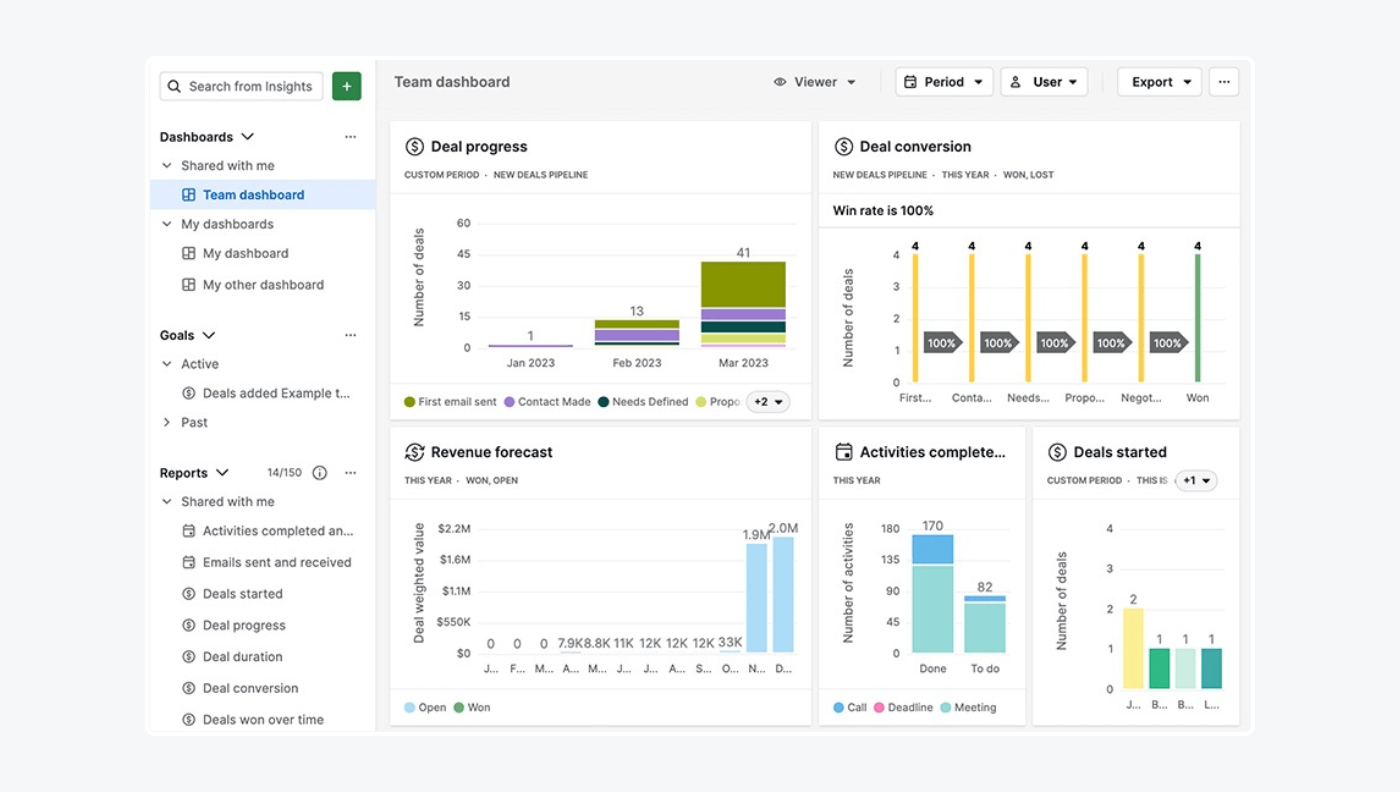
Ratings: 4.2/5 ⭐️ (1,700+ reviews)
Pipedrive is a CRM software designed for small teams to drive sales. This is one of the competitors to HubSpot that shows you the entire customer journey and can be customized to match each sales cycle. It also supports the segmentation and sorting of leads to develop targeted lists for personalized outreach.
Team members can collaborate on deals through group updates as well as set reminders for follow-ups and other pre-conversion activities. Moreover, the reporting dashboard allows employees to effectively track sales progress against their KPIs.
Pros:
- Contact management available
- Integration with Outlook, Gmail, and more
- Quote and order management
Cons:
- Customization problems
- Difficult to set up integrations
- Email glitches occur sporadically
- Free trial available
- Essential ($21.90/mo/agent)
- Advanced ($37.90/mo/agent)
- Professional ($59.90/mo/agent)
- Power ($74.90/mo/agent)
- Enterprise ($119.90/mo/agent)
5. Salesforce
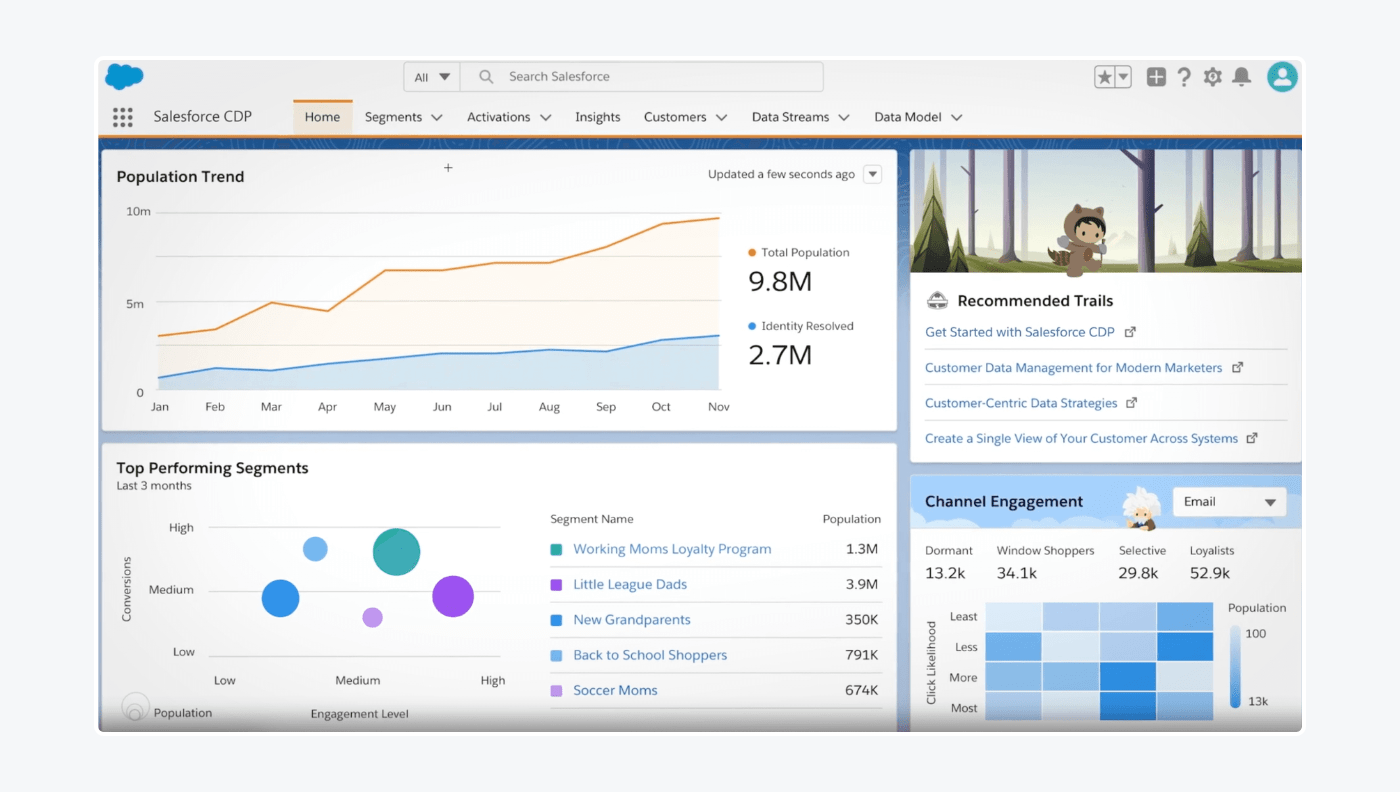
Ratings: 4.3/5 ⭐️ (19,000+ reviews)
Salesforce is a CRM and help desk solution that aims to lower the cost of customer support for your business. According to its site, this HubSpot alternative can reduce support costs by 27%. The platform offers several features like digital engagement, project management, collaboration, and more.
Its AI capabilities can improve agent productivity with automated replies, summaries, and automated responses for client interactions. On top of that, chatbots can handle large volumes of support requests and automatic replies offer multichannel support on the website, through SMS, and WhatsApp.
Pros:
- AI assistant available
- Conversation summaries
- Automated service replies
Cons:
- Relatively expensive plans
- Technical difficulties with routing requests to agents
- Complexity of customization
- Free trial available
- Starter ($25/mo/user)
- Professional ($80/mo.user)
- Enterprise ($165/mo/user)
- Unlimited ($330/mo/user)
- Unlimited+($500/mo/user)
6. Freshworks
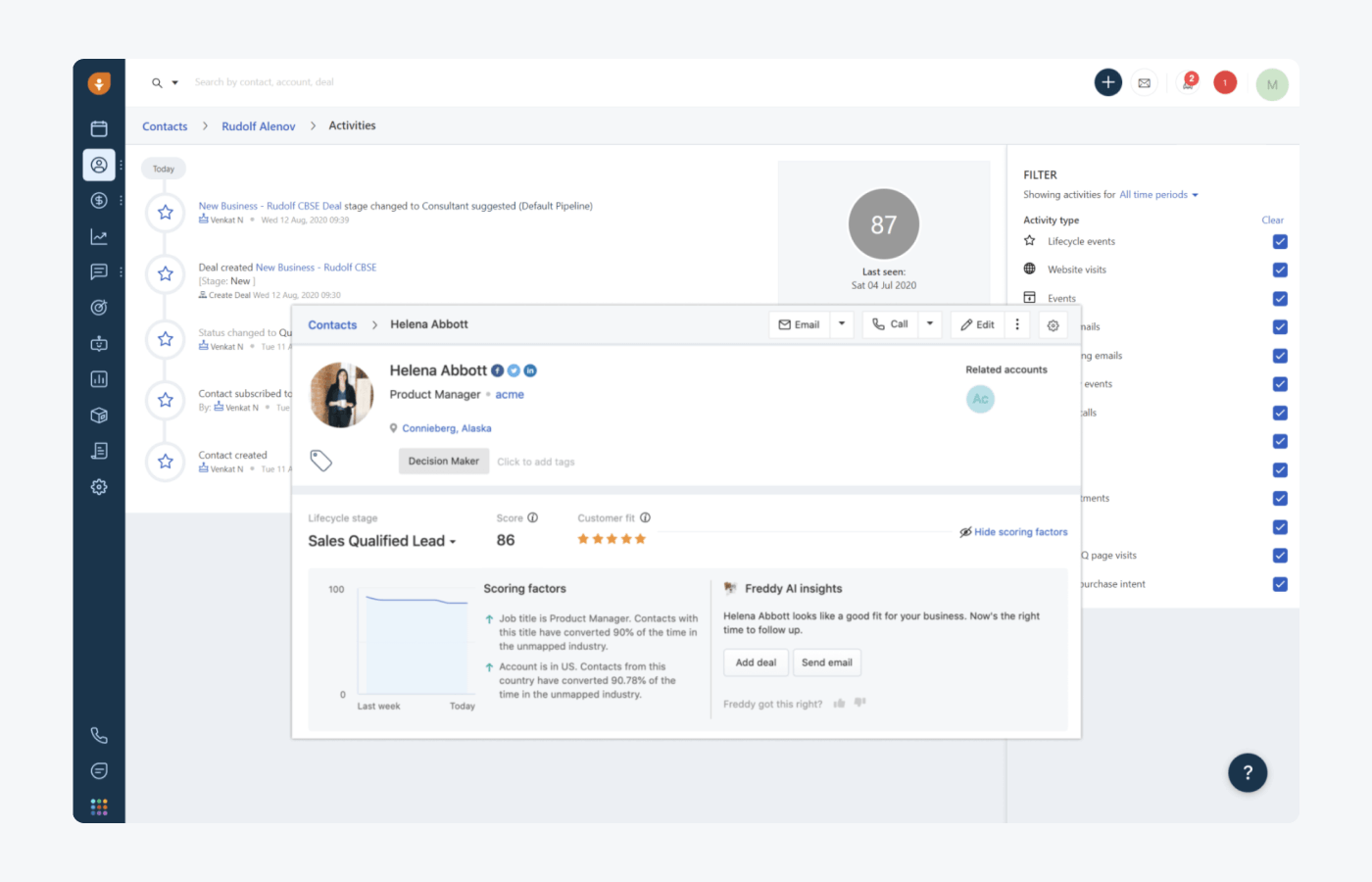
Ratings: 4.4/5⭐️ (3,000+ reviews)
Freshworks is a powerful and intuitive customer service solution. Using this software, you can merge support, IT service, and CRM into a single dashboard. Moreover, it’s an all-in-one communication suite powered by generative AI with a custom chat widget to enhance ticket resolution.
This is one of the best alternatives to HubSpot. It offers efficient ticketing, automated conversations, and a unified workspace for team collaboration. The ticketing system is helpful to managers to sort and prioritize support requests.
Pros:
- Omnichannel capabilities
- Reporting dashboards
- AI automation and workflows
Cons:
- Difficult to customize
- Customer support is hard to reach
- Hard to navigate user interface
- Free version available
- Growth ($18/mo/agent)
- Pro ($59/mo/agent)
- Enterprise ($95/mo/agent)
Read more: Learn the best Freshdesk alternatives and choose the right one for your business.
7. Intercom
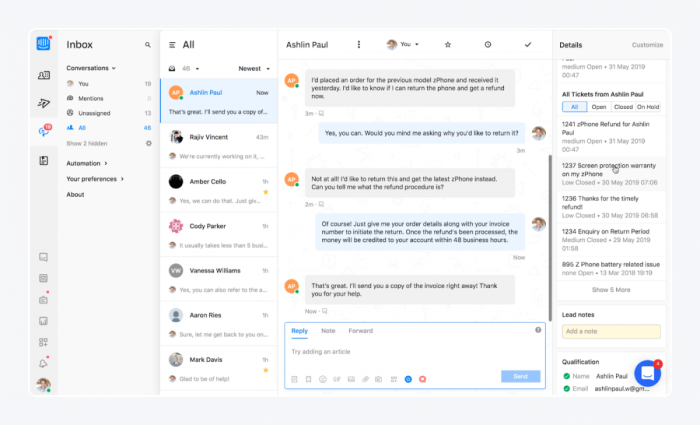
Ratings: 4.5/5 ⭐️ (2,900+ reviews)
Intercom is a help desk software that aims to reduce the scaling costs for support teams through automation. This is one of the HubSpot CRM competitors that allows agents to access several communication channels from a single platform. It combines AI chatbots, proactive support, and omnichannel capabilities to streamline customer service.
Managers can leverage its AI workspace to connect the team inbox feature, tickets, and help center. Its shared email account is designed for quick and efficient collaboration within your team. Furthermore, AI is used for conversation summaries, auto-filling tickets, and creating personalized responses.
Pros:
- AI-enhanced shared inbox tool
- Ticketing system
- Lead qualification features
Cons:
- Unresponsive at times
- Customization is challenging
- Complex to learn and navigate
- Free trial available
- Essential ($39/mo/seat)
- Advanced ($99/mo/seat)
- Expert ($139/mo/seat)
- Proactive support plus ($499/mo)
Read more: Discover the top Intercom alternatives available on the market.
8. Mailchimp
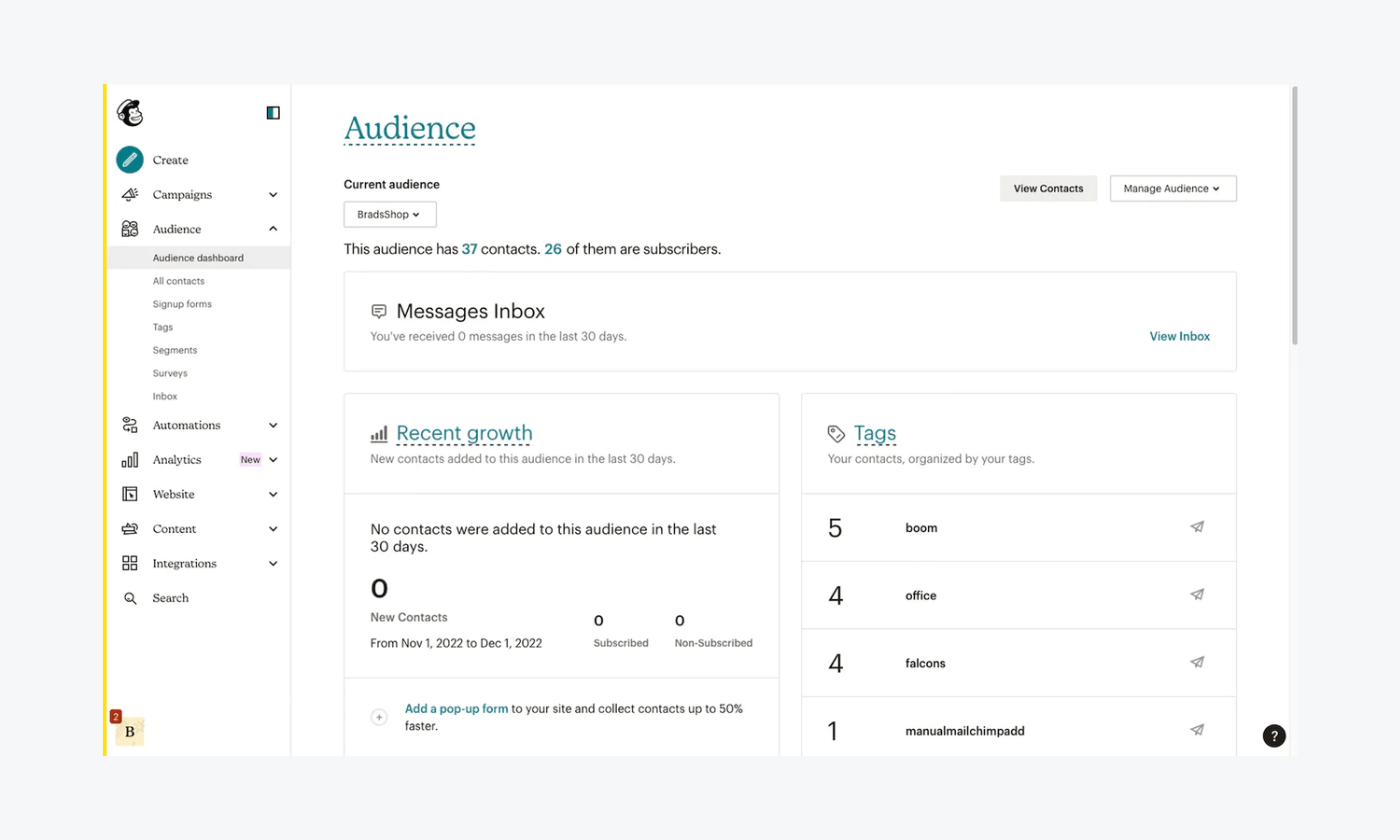
Ratings: 4.4/5 ⭐️ (5,100+ reviews)
Mailchimp is an email marketing and automation software for scaling businesses. This is one of the HubSpot marketing alternatives that enables users to sell their products online, connect with consumers, and grow their audience through multichannel marketing campaigns. Some of the channels include SMS, email, landing pages, social media, and ads.
Moreover, Mailchimp users can create promotional content using generative AI. Staff can personalize emails based on browsing or purchase data. Using customer segmentation, employees can target clients according to their purchasing patterns and predicted attributes.
Pros:
- Automated email responses
- Custom reports and analytics
- Integration with Microsoft Dynamics
Cons:
- Gets expensive for a large mailing list
- Limited email templates
- Cluttered user interface
- Free version available
- Essentials ($13/mo)
- Standard ($20/mo)
- Premium ($350/mo)
9. Klaviyo
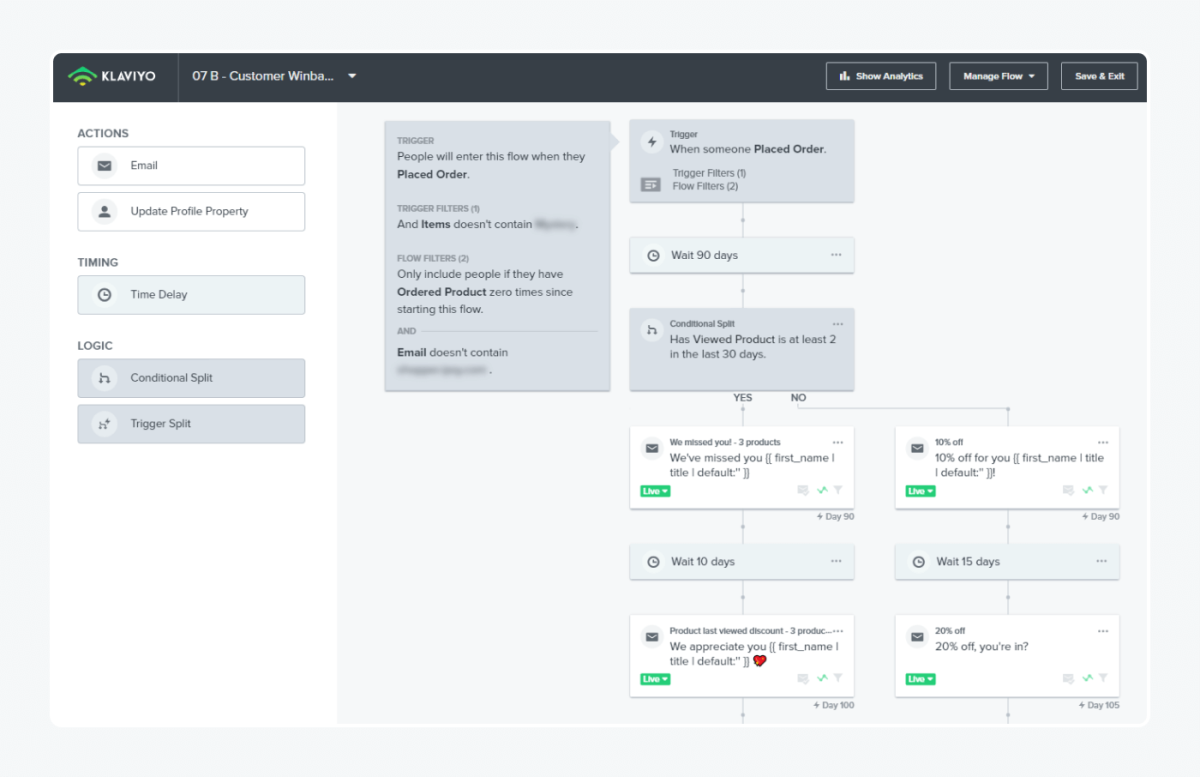
Ratings: 4.6/5 ⭐️ (1000+ reviews)
Klaviyo is a marketing automation software designed for enterprises looking to build smart relationships with their audience. It has a real-time database that acts as a central repository for all consumer information. This is one of the best HubSpot alternatives for small businesses. It makes creating and delivering personalized experiences easy via SMS, email, websites, ads, and mobile apps.
Through Klaviyo, agents can get an accurate picture of a consumer’s buying habits. Also, the system can recommend products to an audience and track success across channels. On top of that, the AI promptly writes messages, responds to reviews, and segments your audience.
Pros:
- Built-in forms and pop-ups
- Precise multi-channel attribution
- Predictive analytics to track metrics
Cons:
- Requires a lot of user training
- Lacks social media marketing
- Mass emailing hitches
- Free version available
- Email ($20/mo)
- Email & SMS ($35/mo)
10. Zoho desk
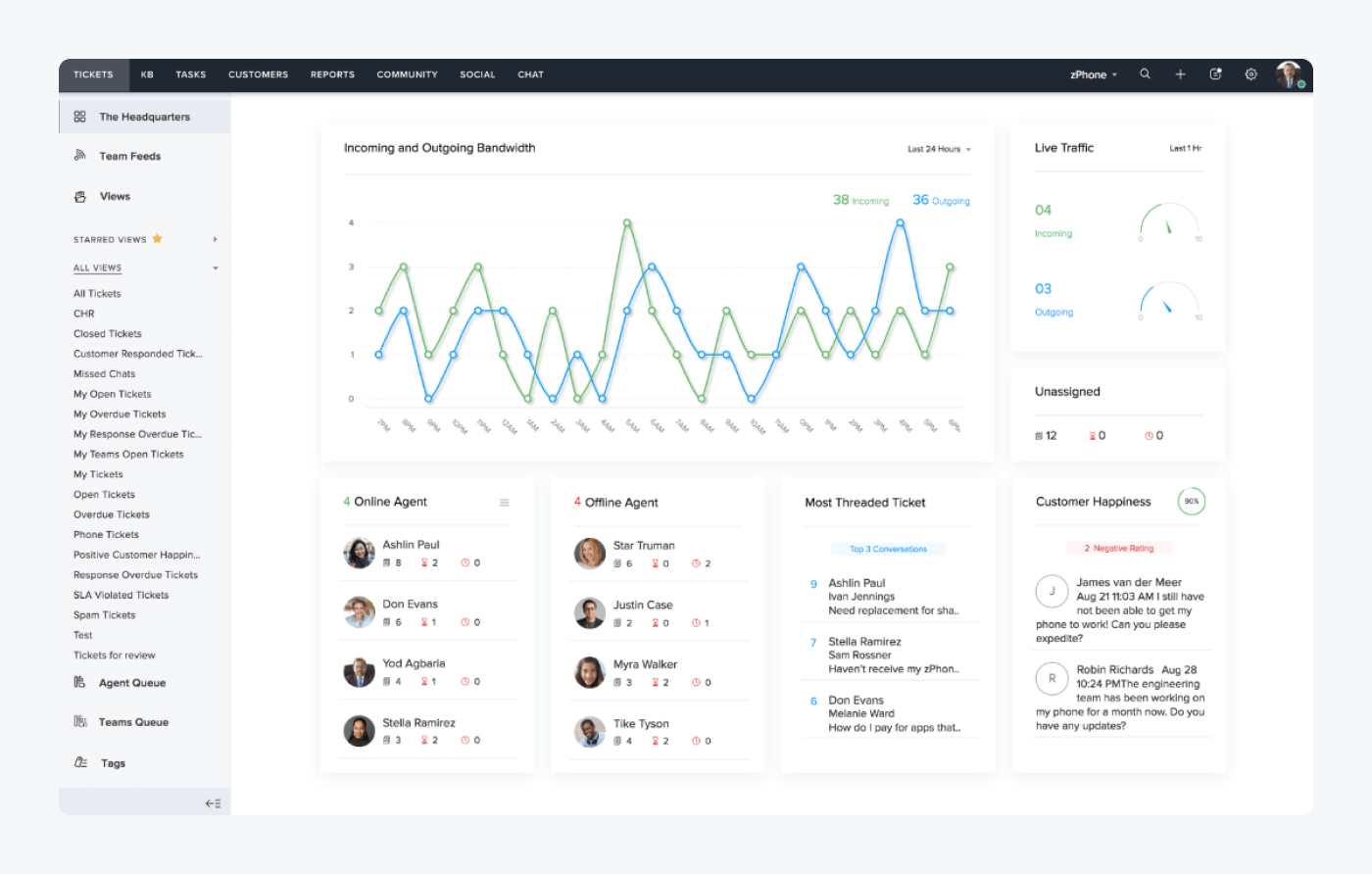
Ratings: 4.4/5⭐️ (5,300+ reviews)
Zoho Desk is a help desk solution that aims to simplify support processes using automation. The software tracks client requests across multiple channels, departments, and products thanks to its superior live chat ticketing system.
This is the best alternative to HubSpot if you want to empower agents through the shared inbox software for group cooperation, omnichannel communication, and automation suite. Its contextual AI can auto-tag open tickets, carry out sentimental analysis, and share curated responses from your knowledge base. On top of that, agents can also close tickets on the go using Zoho Desk mobile apps.
Pros:
- AI assistant available
- Automation suite
- Shared inbox solution
Cons:
- Limited features compared to other solutions
- Slow customer support
- Steep learning curve for newcomers
- Free trial available
- Standard ($20/mo/user)
- Professional ($35/mo/user)
- Enterprise ($50/mo/user)
Alternatives to HubSpot: conclusion
There are plenty of reasons why a business may opt to go for alternative software to HubSpot. This can include costly add-ons, limited contact customizations, poor user experience, and a lack of analytics and reporting options. Whatever the reasons you may conclude a simpler or more compatible CRM is a better option.
So, what is the best HubSpot alternative?
If you look for robust features suitable for an enterprise company:
- Zendesk
- Intercom
- Salesforce
If you primarily look for email marketing automation combined with a hefty CRM:
- Activecampaign
- Mailchimp
- Pipedrive
- Klaviyo
If you look for an AI-powered features and multichannel communication suite for SMBs, you should opt for:
- Tidio
- Freshworks
- Zoho desk
Why not give Tidio a test drive today?
Use the best HubSpot alternative available on the market
